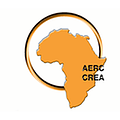Investing in Sub-Saharan Africa for Growth: Public or Private?
September 27, 2024
With the contribution of Joël Cariolle (FERDI).
Researches conducted within the Digital Trust Chaire (Cariolle J. Le Goff M., Santoni O., 2019) have contributed to this report.
Tapsoba S.J. et al (2020)"Digitalization in Sub-Saharan Africa", chp 3 in Regional Economic Oulook, Sub-Saharan Africa. COVID-19: An Unprecedented Threat to Development, IMF Report, April 2020


